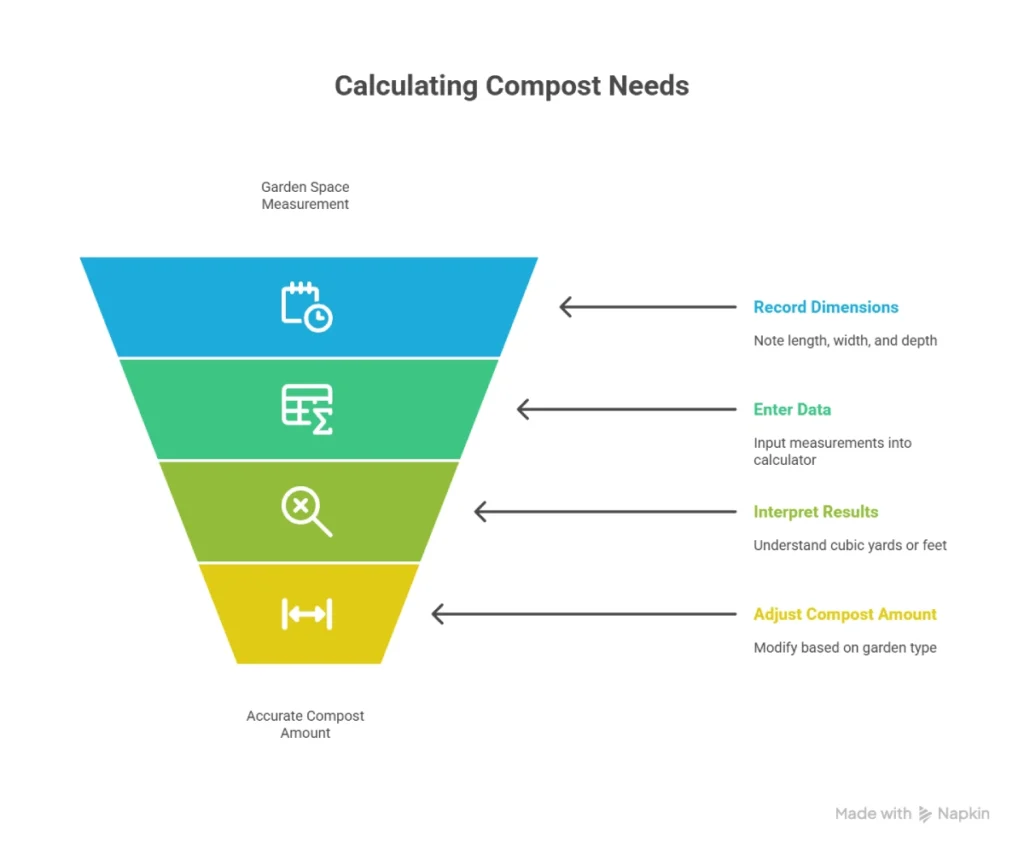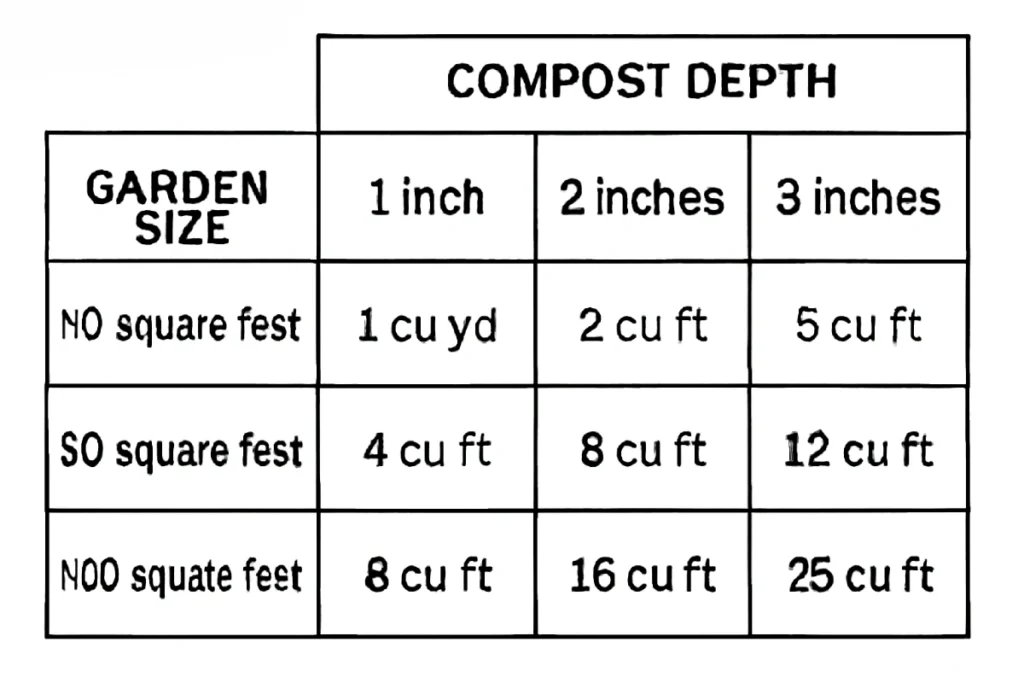Calculate Your Compost Needs
Enter your garden details to determine how much compost you’ll need
Your Compost Requirements
Composting Tips
For best results, mix compost thoroughly into the top 6 inches of soil. Water well after application to help nutrients penetrate.
Clay soils benefit from more frequent, lighter applications of compost to improve drainage.
Benefits of Compost
Compost improves soil structure, provides essential nutrients, helps retain moisture, and supports beneficial microorganisms.
Compost Calculation Report
Your personalized garden compost needs calculation
Garden Details
Calculation Results
- Calculate Your Compost Needs
- Compost Calculation Report
- Introduction to Compost Calculators
- Understanding Composting Basics
- How Does a Compost Calculator Work?
- Step-by-Step Guide: Using a Compost Calculator
- Advanced Compost Calculator Features (Expert Section)
- Choosing the Best Compost Calculator for Your Needs
- Practical Examples & Case Studies
- Troubleshooting & Optimization Tips
- Conclusion & Next Steps
- Frequently Asked Questions (FAQs)
Introduction to Compost Calculators
What is a Compost Calculator?
If you’re new to composting, you might wonder how to figure out how much compost you need for your garden. A compost calculator helps you figure out how much compost you need based on your garden’s size, soil health, and the depth of mulch you want. Think of it as your composting GPS guiding you on the right path without the guesswork. Whether revamping your garden or starting fresh, it takes the stress out of making the perfect compost mix.
Why Gardeners Need One
Composting can seem like a bit of a guessing game, especially when you’re working with different soil types and compost needs. A compost calculator simplifies everything. Instead of making an educated guess or using outdated methods, you can rely on solid data. It saves you time, effort, and resources, making sure your garden gets the right amount of compost without any waste.
Benefits of Using a Compost Calculator
- Saves Time & Resources: No more running to the garden center to buy too much or too little compost. A calculator helps you get the right amount the first time, saving you trips and money.
- Improves Garden Health & Sustainability: Providing a more accurate compost mix, you help your plants grow stronger and your soil become healthier. Over time, this leads to a more sustainable and vibrant garden.
Understanding Composting Basics

What is Composting?
Composting is nature’s way of recycling. It’s the process where organic waste, like food scraps and yard trimmings, breaks down into rich, nutrient-dense material called compost. Think of it as turning yesterday’s leftovers into tomorrow’s garden gold. The result? A natural soil amendment that helps your plants grow strong and healthy.
Key Components of Compost
For composting to work, you need a good balance of materials:
- Browns (carbon-rich materials): Think dry leaves, straw, or cardboard. These provide the carbon that helps fuel the process.
- Greens (nitrogen-rich materials): Kitchen scraps, lawn clippings, and coffee grounds supply the nitrogen your compost needs to decompose.
- Moisture & Aeration: Compost must be moist but not too wet. Like a good dance partner, it needs air—turning it regularly ensures everything breaks down properly.
Why Getting the Right Mix Matters
The key to great compost is getting the mix just right. The compost will break down too slowly if you don’t have enough carbon (browns). Too much nitrogen (greens), and it could start to smell. A balanced mix speeds up decomposition and produces high-quality compost, producing better nutrients for your garden.
How Does a Compost Calculator Work?
Inputs Required
To get started with a compost calculator, you’ll need to know a few details about your garden:
- Garden Bed Size (Length, Width, Depth): Measure the area you want to cover with compost. Based on this space, the calculator will help you determine how much is needed.
- Desired Compost Depth: How deep do you want to apply your compost? Different plants need different depths, so this is an essential factor.
- Current Soil Condition: Are you working with sandy, clay, or loamy soil? The type of soil influences how much compost you’ll need.
Volume vs. Weight: What Matters for Your Garden?
When calculating compost, volume is more important than weight. Compost’s density can vary based on moisture content, so calculating by volume (not weight) gives you a better idea of how much to order. Some calculators account for this difference, so you get the most accurate results.
Common Mistakes to Avoid
- Overestimating or Underestimating Needs: It’s easy to guess too much or too little. The calculator helps avoid that.
- Ignoring Soil Amendments: Remember to factor in any soil amendments (like biochar or manure) that might alter the necessary compost.
Step-by-Step Guide: Using a Compost Calculator

Step 1: Measure Your Garden Space
Start by measuring your garden area. This is the foundation of your calculation. Record the dimensions (length, width, and depth) of the area you intend to plant in. Don’t forget to note any raised beds or containers requiring different measurements. Accuracy matters here, so take your time and double-check.
Tip: If unsure about your measurements, consider using a string or tape measure to mark out the area before you start. It’s also helpful to sketch a quick diagram to visualize your garden space.
Step 2: Enter Your Data
Once you have your measurements, enter them into the compost calculator. Most calculators will ask for the dimensions of your garden bed and the depth of compost you need. Some may even ask about your soil type and the materials you plan to compost. Just go through the steps and fill in what’s requested.
Step 3: Interpret the Results
After entering your data, the calculator will give you a result—usually in cubic yards or cubic feet. This will help you determine the right amount of compost for your space.
But what does that number mean for your composting plan? Well, it’s time to adjust. For example, if you’re working with raised beds, you might need less compost because you’re filling a smaller space. If you’re composting for a larger lawn area, you’ll likely need more. The calculator will help you fine-tune the amount based on your specific needs.
This step removes the guesswork, ensuring your garden gets the perfect amount of compost.
Advanced Compost Calculator Features (Expert Section)
Customizing for Different Compost Types
Not all composting methods are the same, and a good compost calculator can help you adjust. Whether you’re hot composting (which works fast with higher temperatures) or cold composting (a slower, low-maintenance method), the calculator can guide you based on your chosen approach. It can also be adjusted for vermicomposting, letting worms handle the heavy lifting. Each type has different needs; the right calculator will factor those in for you.
Factoring in Soil Amendments
Compost is valuable, but sometimes your garden soil needs a little more than that. If you’re adding amendments like biochar, manure, or other soil enhancers, a good compost calculator will help you factor these in. These additions change how much compost you need, so getting them right is key. If the soil is too sandy, you may need more compost to improve moisture retention. Compost can help break it up and enhance aeration if it’s clay-heavy.
Batch vs. Continuous Composting Calculations
Are you composting in batches (one pile at a time) or continuously (adding new materials as you go)? Continuous composting requires a more dynamic calculation, adjusting how much compost will break down at any given time. A compost calculator can help you decide how often to turn your compost and how much you can add without overwhelming your system.
Integrating with Garden Planning Apps
Some advanced calculators can sync with garden planning apps, helping you keep track of all your gardening needs in one place. This integration means you can plan not just your compost but also your planting schedule, watering, and other garden tasks, all based on real-time data. It’s like having a whole garden management system at your fingertips.
Choosing the Best Compost Calculator for Your Needs

Free vs. Paid Tools
When it comes to compost calculators, you’ve got options. Free tools are a great starting point, especially for beginners who want to determine how much compost they need. They are simple and easy to use, but might lack advanced features. On the other hand, paid tools often come with extra features like customizable settings, integration with garden planning apps, and better support. A paid tool could be worth the investment if you’re serious about composting and need more precise calculations for larger projects.
Pros and Cons
| Feature | Free Tools | Paid Tools |
| Cost | Free | Monthly or one-time fee |
| Customization | Basic settings | Advanced options & integration |
| Support | Limited | Customer support & resources |
| Ease of Use | Simple & beginner-friendly | More complex, but more accurate |
Mobile Apps vs. Web Calculators
A mobile app might be best if you’re always on the go or working in the garden. It offers the convenience of having the calculator in your pocket whenever needed. On the other hand, web calculators are better for detailed, long-term planning because they provide a larger screen for input and display, and they’re often more accurate due to the extra resources available online.
Key Features to Look For
When choosing your compost calculator, look for these features:
- User Interface: Is it easy to navigate? You want something intuitive and straightforward to use.
- Accuracy: Does it give you realistic results based on your input? A calculator that can handle different soil types and composting methods is a big plus.
- Support and Resources: Does it offer tutorials or customer support if you need help?
- Extra Tools: Bonus features like garden planning integration or material calculators can make your composting process even easier.
Practical Examples & Case Studies
Beginner Example: Small Urban Garden
Let’s say you’ve just started a small urban garden and want to calculate how much compost you need for your flower bed. You’ve measured your garden: 8 feet long, 4 feet wide, and you want a 2-inch layer of compost. With a compost calculator, you plug in the length, width, and depth, and it shows you need around 0.5 cubic yards. Easy, right? Now you know exactly how much to order, and you can grow your garden without over- or underestimating your needs.
Intermediate Example: Community Garden Plot
Now, imagine you’re working on a community garden with several plots. You have three raised beds, each 10 feet long, 4 feet wide, and 12 inches high. The compost calculator can help you calculate the total compost needed for all three beds, considering that raised beds typically require more precise measurements. Once the calculator gives you the numbers, you can plan how much compost to buy in bulk, ensuring you have enough for each plot.
Expert Example: Large-Scale Landscaping Project
The needs are more complex for a larger project, like a commercial landscaping job. You might need compost for a big lawn or an entire property. You need compost to cover 5,000 square feet with a 1-inch layer. The compost calculator can give you an accurate estimate of about 3.5 cubic yards of compost, factoring in the depth and area. This ensures you order the right amount for the job and don’t waste money or materials.

Troubleshooting & Optimization Tips
What to Do If Your Compost Isn’t Working
Sometimes, composting doesn’t go as planned. If your compost pile smells bad or isn’t breaking down, it’s often a sign that something’s off. The most common issues are:
- Too much nitrogen (greens): If your compost smells like rotten eggs, it’s likely overloaded with nitrogen. Add more carbon-rich materials (like dry leaves or straw) to balance it out.
- Not enough moisture: Compost must stay damp, like a wrung-out sponge. If it’s too dry, decomposition slows down. Just sprinkle a little water to moisten the pile.
- Lack of oxygen: Compost must “breathe,” so turn your pile regularly. If it’s not aerated, the decomposition process slows, and you’ll end up with a smelly mess.
How to Adjust Calculations for Poor Soil
If your soil is particularly tough—maybe clay-heavy, sandy, or compacted—you’ll likely need more compost to improve it. When using the compost calculator, add extra compost to the soil’s condition by adding, for example, Clay soils benefit from more compost to improve aeration, while sandy soils need more to help with moisture retention. The calculator will give you a good starting point, but don’t be afraid to tweak it based on your soil’s needs.
Seasonal Considerations
Composting changes with the seasons. During the warmer months, your compost will break down faster because the heat speeds up the process. In winter, decomposition slows down, and you might need to adjust your composting strategy. If you plan to add compost in the fall, you might not need as much because your plants are going dormant and won’t need as many nutrients. Adjusting your calculations seasonally ensures you’re not overdoing it or wasting materials.
Conclusion & Next Steps
Recap of Key Takeaways
A compost calculator is a simple yet highly effective way to ensure your garden gets the right amount of compost. By understanding your garden’s size, soil condition, and compost depth, you can optimize the health of your plants without wasting materials. From beginners to experts, anyone can benefit from a compost calculator—it’s like having a gardening assistant to guide you every step of the way.
Encouragement to Start Calculating
Now that you’ve learned the basics, it’s time to put them into practice. Don’t let the guesswork slow you down; use a compost calculator to streamline your gardening process. Whether starting a small urban garden or planning a large-scale landscaping project, getting the compost right is key to long-term garden success.
Frequently Asked Questions (FAQs)
Why is knowing the right amount of compost important?
Applying the correct amount ensures plants get enough nutrients without waste or soil imbalance. Using too little compost may limit soil enrichment, while overapplication can cause nutrient runoff or poor growth. A compost calculator helps optimize usage for healthy soil and better plant growth.
Can a compost calculator help with cost estimation?
Yes. Some calculators allow input of compost cost per bag or cubic yard, helping estimate the total expense for your project. This aids budgeting before purchasing compost.
Is it possible to make my own compost instead of buying it?
Absolutely. Making compost at home is free and sustainable. While calculators help with purchasing, they can also guide the correct ratios and volumes required if producing compost yourself.
Are there different compost calculators for different gardening needs?
Yes. Some calculators tailor recommendations based on garden type, plant species, or lawn condition. Others provide guidance for large-scale farming or specialized composting, like vermicomposting.
Related Calculator